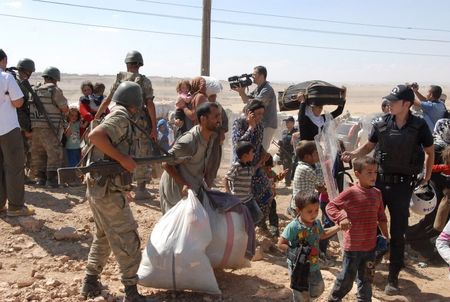By Seyhmus Cakan
DIKMETAS Turkey (Reuters) - Iraqi Kurdish leader Masoud Barzani called on Friday for international intervention to protect a Kurdish town in neighbouring Syria from Islamic State fighters who have forced many Syrian Kurds to flee across the border into Turkey.
Thousands of Kurds crossed the frontier on Friday, fearing an imminent attack on the border town of Ayn al-Arab, known as Kobani in Kurdish, as Islamic State (IS) fighters advanced after seizing dozens of nearby villages over the past two days.
"I call on the international community to use every means as soon as possible to protect Kobani," Barzani, the president of Iraq's autonomous Kurdish region, said in a statement. "IS terrorists ... must be hit and destroyed wherever they are.
The United States is drawing up plans for military action in Syria against the radical Sunni Muslim group which has seized swathes of territory in Syria and Iraq, proclaiming a caliphate in the heart of the Middle East.
IS gains have set back efforts by Kurds to exploit the three-year-old civil war in Syria and carve out regions of their own in the northeast of Iraq.
The violence is also a headache for neighbouring Turkey, which is already sheltering more than 1.3 million Syrian refugees and fears hundreds of thousands more, waiting in the mountains on the Syrian side of the 900-km (560-mile) border, could seek to cross as fighting escalates.
The Syrian Observatory for Human Rights, which tracks developments in the war, said on Friday Kurdish forces had withdrawn from more than 60 villages in the face of the IS advance.
Ocalan Iso, deputy head of the Kurdish forces in Kobani, said he did not know how many villages had fallen to IS and that it was not that many, but he acknowledged: "We have lost communication with some of the villages."
Esmat al-Sheikh, head of the Kurdish forces defending Kobani, said fierce clashes continued to the east, west and south of the town, which Turkey adjoins to the north. IS fighters armed with rockets, artillery, tanks and armoured vehicles seized from the Iraqi army in Mosul had advanced to within 20 km of Kobani, he told Reuters by telephone.
"The whole world is silent," he said. "Every day we hear there is going to be an attack on ISIS (Islamic State). But where is it? ... Will it come after everyone is already dead?"
The attack prompted a Kurdish militant call to the youth of Turkey's mainly Kurdish southeast to join the fight against IS, whose offensive began on Tuesday after the U.S. military said Syrian moderates would probably need the Syrian Kurds' help to defeat Islamic State, along with the help of Turkey and Jordan.
Sheikh said dozens of civilians -- women, children and the elderly -- had been killed on roads in the area. "They took women, girls, small children and youths as hostages but we cannot count them," he said. He had no figures on the number of Kurdish fighters killed.
Iso said the Kurds had evacuated 100 nearby villages because of Islamic State shelling. "These villages have become battlefields. They do not control them," he said.
Redur Xelil, spokesman for the main Kurdish armed group in Syria, YPG, said in a statement that seven Kurdish fighters and a number of IS fighters had been killed in clashes in two villages.
FLEEING "TO ESCAPE DEATH"
Machinegun fire and shelling could be heard from miles away as Turkish soldiers escorted about 4,000 Syrian Kurds, mostly women and children, over the border at Dikmetas, a Turkish village 20 km along the frontier from Kobani.
One woman was hospitalised after stepping on a landmine.
Turkish security forces at one point fired tear gas and water cannon to disperse a group of about 100 people as they sought to cross into Syria on Friday in an apparent protest against the tight border security.
Turkish Prime Minister Ahmet Davutoglu, who has said the priority is to give aid on the Syrian side of the border, said he had given the order for the Syrians to be let in after receiving information that 4,000 had arrived seeking shelter.
"When our brothers from Syria and elsewhere arrive at our borders to escape death ... without discrimination over religion or sect, we take them in and we will continue to take them in," he told reporters during a trip to Azerbaijan.
An official from the Turkish relief agency AFAD told Reuters they had been preparing for an influx for days and tents had already been sent.
Turkey is trying to persuade the United States of the need to create a "buffer zone" inside Syria, Turkish officials said, a safe haven on the border likely to require a foreign-patrolled no-fly zone where displaced civilians could be given aid.
Talks with U.S. officials were continuing on the idea, a senior Turkish official said.
Western states have increased contact with the main Syrian Kurdish political party, the PYD - whose armed wing is the YPG, since IS seized areas of Iraq in June.
The YPG says it has 50,000 fighters and should be a natural partner in a coalition the United States is trying to assemble to fight IS.
Syrian Kurds' relationship with the West is complicated by their ties to the the Kurdistan Workers Party (PKK), a group listed as a terrorist organisation by many Western states because of the militant campaign it has waged for Kurdish rights in Turkey.

The United States is conducting air strikes against IS in Iraq and last month U.S. President Barack Obama authorised surveillance flights over Syria. Last week he said he would not hesitate to strike IS.
(Additional reporting by Orhan Coskun, Jonny Hogg and Tulay Karadeniz in Ankara, Tom Perry, Alexander Dziadosz and Laila Bassam in Beirut, Isabel Coles in Arbil; Writing by Daren Butler; Editing by Nick Tattersall and Dominic Evans)
